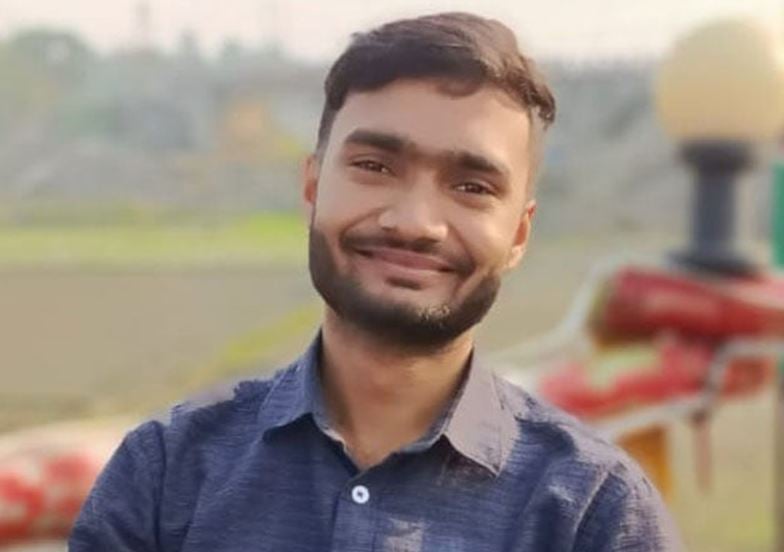
By Borun Kumar Dash, back from Sirajganj
DHAKA, May 15, 2025 (BSS) – It was August 5, 2024. A procession toward Shafipur Ansar Academy in Gazipur symbolized the final victory of the student-people uprising. Crowds surged across the capital with dreams of a just and discrimination-free Bangladesh and the joy of the downfall of the autocratic regime.
Twenty-two year old Antor Islam was one of those cheering people, who sustained a bullet injury in his leg just the day before.
Despite a bullet wound in his leg, he was in the forefront of the victory procession brought out following the collapse of the nearly 16-year-long fascist regime that was heading toward Shafipur Ansar Academy.
But tragically, the final moments of the historic anti-discrimination uprising turned into the moment of bidding farewell to this perishable world for Antor as within a moment, “police bullets struck his face and head”. He collapsed, bleeding on the ground—a living symbol of anti-discrimination student movement turned into a tragic martyr of state brutality.
Born in 2002 in Kaizuri village at Shahjadpur Upazila in Sirajganj district, Antor was the youngest among six children -- two sons and four daughters -- of Md Abdul Haque (65) and Jaynab Khatun (65).
Antor was a third-year history student at Shahzadpur Government College. After their home was devoured by flood water in 2007, his family had to struggle for survival by erecting a new house on three decimals of land with no farmland of their own.
Therefore, along with continuing his studies, he had been working at a leather product selling outlet in Gazipur to support his education and family.
After his four sisters were married off and his elder brother got separated, Antor had emerged as the lone breadwinner for his family as his father could not do any work due to illness.
Antor’s mother, Jaynab Khatun, burst into tears as this correspondent approached her for some words about her martyred son at their village home in Sirajganj.
“My son loved planting trees. It was his passion. Every time he had some money, he bought trees and planted them in the homestead,” Antor’s grief-stricken mother recalled her son’s love for nature.
She added: “Our three-decimal homestead has every type of fruit tree because of him—even our relatives' homes bear the mark of his green touch”. Antor also used to plant trees on the homestead of his elder sisters.
Pointing at the mango and lemon trees that Antor planted, Jaynab said, “See how full it is with fruit! But Antor will never taste it. I used to tell him to stop planting trees as there was no more space. He never listened. Now every leaf, every branch reminds me of him. It seems that the soul of my Antor is mixed with the greenery of these trees”.
Antor’s brother-in-law (elder sister’s husband), Sajjadul Haque Topu, said, “Antor wasn't just my brother-in-law; I loved him like my own child. He used to tell me everything he needed”.
Noting that every tree in their yard was planted by Antor, he said, “I never imagined we’d lose him this way.”
Antor’s mother said that he never let poverty stop his education. He supported his family and education with his own earnings.
“Just wait two more years, Maa. Once I get a job, your suffering will end,” Jaynab quoted her son as he had told her.
“Now, we are struggling to manage even our emergency medicines,” she wailed, saying that Antor’s death left them distraught.
Noting that Antor joined the movement responding to the call of anti-discrimination student movement leaders, Jaynab said her son joined the victory procession on August 5 despite sustaining a rubber bullet injury in his leg on August 4.
She said when the procession was advancing towards Shafipur Ansar Academy, police opened fire on them. One bullet entered through his eye and exited the back of his head while another pierced through his forehead and exited through the back of his head too, leaving him spot dead.
Jaynab said after hours Antor was shot, fellow protesters rescued him and took him to the Kaliakoir Upazila Health Complex, where the duty doctor declared him dead.
She said Antor’s body was taken to his village home by 2.30am that night while he was laid to his eternal rest at Kaijuri graveyard next morning (August 6) following his namaj-e-janaza at Kaijuri Madrasah ground.
Jaynab demanded exemplary punishment for the killers of Antor. “I want justice. I want capital punishment for those who killed my son”.
Seeking government help to survive, she said, “We lost our only breadwinner. Now we have no other income. We need government help to survive”.